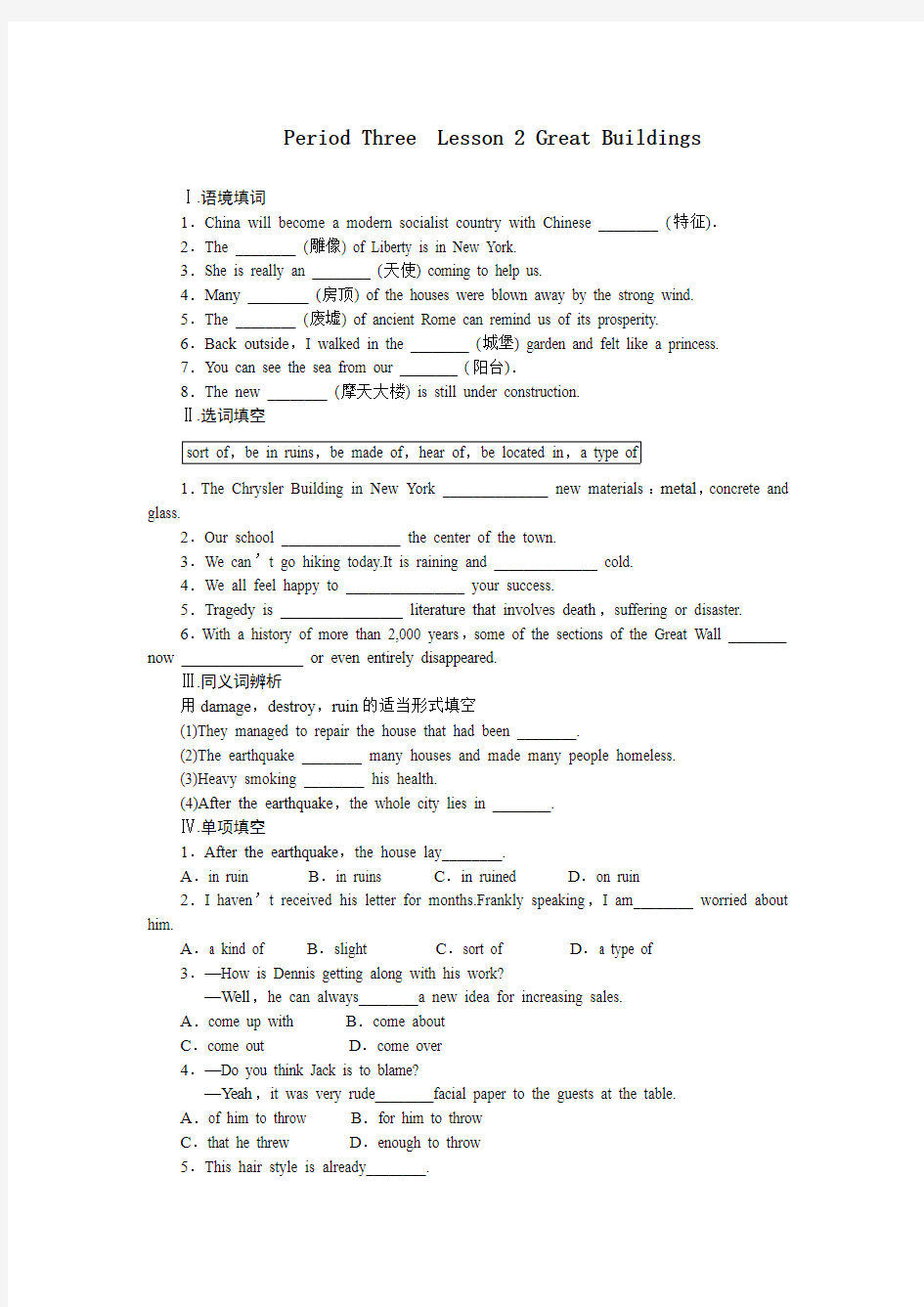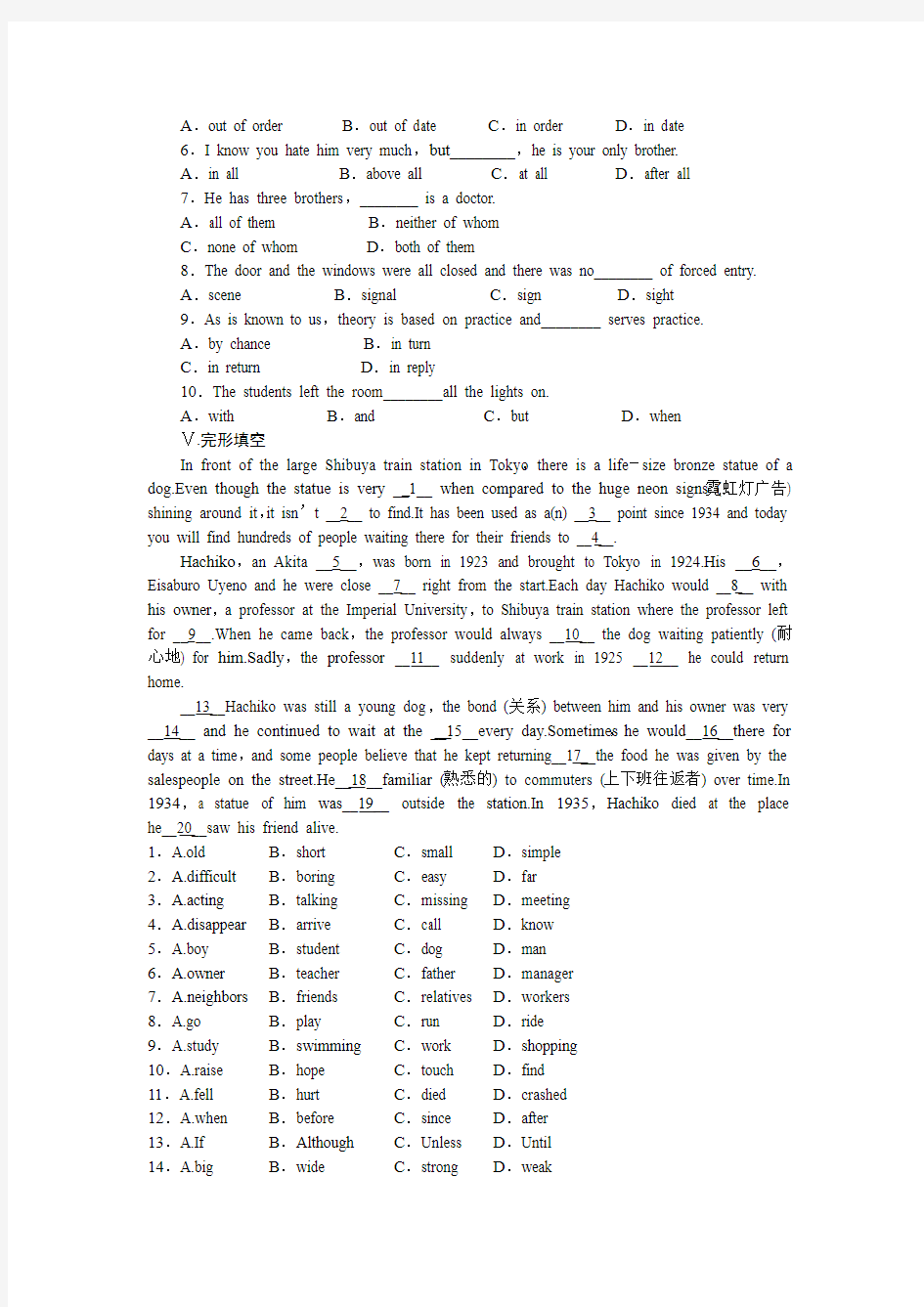北师大版高中英语必修二Unit6Periodthree


Period Three Lesson 2 Great Buildings
Ⅰ.语境填词
1.China will become a modern socialist country with Chinese ________ (特征).
2.The ________ (雕像) of Liberty is in New York.
3.She is really an ________ (天使) coming to help us.
4.Many ________ (房顶) of the houses were blown away by the strong wind.
5.The ________ (废墟) of ancient Rome can remind us of its prosperity.
6.Back outside,I walked in the ________ (城堡) garden and felt like a princess.
7.You can see the sea from our ________ (阳台).
8.The new ________ (摩天大楼) is still under construction.
Ⅱ.选词填空
sort of,be in ruins,be made of,hear of,be located in,a type of
1.The Chrysler Building in New York ______________ new materials:metal,concrete and glass.
2.Our school ________________ the center of the town.
3.We can’t go hiking today.It is raining and ______________ cold.
4.We all feel happy to ________________ your success.
5.Tragedy is ________________ literature that involves death,suffering or disaster.
6.With a history of more than 2,000 years,some of the sections of the Great Wall ________ now ________________ or even entirely disappeared.
Ⅲ.同义词辨析
用damage,destroy,ruin的适当形式填空
(1)They managed to repair the house that had been ________.
(2)The earthquake ________ many houses and made many people homeless.
(3)Heavy smoking ________ his health.
(4)After the earthquake,the whole city lies in ________.
Ⅳ.单项填空
1.After the earthquake,the house lay________.
A.in ruin B.in ruins C.in ruined D.on ruin
2.I haven’t received his letter for months.Frankly speaking,I am________ worried about him.
A.a kind of B.slight C.sort of D.a type of
3.—How is Dennis getting along with his work?
—Well,he can always________a new idea for increasing sales.
A.come up with B.come about
C.come out D.come over
4.—Do you think Jack is to blame?
—Yeah,it was very rude________facial paper to the guests at the table.
A.of him to throw B.for him to throw
C.that he threw D.enough to throw
5.This hair style is already________.
A.out of order B.out of date C.in order D.in date
6.I know you hate him very much,but________,he is your only brother.
A.in all B.above all C.at all D.after all
7.He has three brothers,________ is a doctor.
A.all of them B.neither of whom
C.none of whom D.both of them
8.The door and the windows were all closed and there was no________ of forced entry.
A.scene B.signal C.sign D.sight
9.As is known to us,theory is based on practice and________ serves practice.
A.by chance B.in turn
C.in return D.in reply
10.The students left the room________all the lights on.
A.with B.and C.but D.when
Ⅴ.完形填空
In front of the large Shibuya train station in Tokyo,there is a life-size bronze statue of a dog.Even though the statue is very __1__ when compared to the huge neon signs (霓虹灯广告) shining around it,it isn’t __2__ to find.It has been used as a(n) __3__ point since 1934 and today you will find hundreds of people waiting there for their friends to __4__.
Hachiko,an Akita __5__,was born in 1923 and brought to Tokyo in 1924.His __6__,Eisaburo Uyeno and he were close __7__ right from the start.Each day Hachiko would __8__ with his owner,a professor at the Imperial University,to Shibuya train station where the professor left for __9__.When he came back,the professor would always __10__ the dog waiting patiently (耐心地) for him.Sadly,the professor __11__ suddenly at work in 1925 __12__ he could return home.
__13__Hachiko was still a young dog,the bond (关系) between him and his owner was very __14__ and he continued to wait at the __15__every day.Sometimes,he would__16__there for days at a time,and some people believe that he kept returning__17__the food he was given by the salespeople on the street.He__18__familiar (熟悉的) to commuters (上下班往返者) over time.In 1934,a statue of him was__19__ outside the station.In 1935,Hachiko died at the place he__20__saw his friend alive.
1.A.old B.short C.small D.simple
2.A.difficult B.boring C.easy D.far
3.A.acting B.talking C.missing D.meeting
4.A.disappear B.arrive C.call D.know
5.A.boy B.student C.dog D.man
6.A.owner B.teacher C.father D.manager
7.A.neighbors B.friends C.relatives D.workers
8.A.go B.play C.run D.ride
9.A.study B.swimming C.work D.shopping
10.A.raise B.hope C.touch D.find
11.A.fell B.hurt C.died D.crashed
12.A.when B.before C.since D.after
13.A.If B.Although C.Unless D.Until
14.A.big B.wide C.strong D.weak
15.A.yard B.house C.school D.station
16.A.stay B.remember C.start D.leave
17.A.by B.according to C.without D.because of
18.A.changed B.became C.wished D.liked
19.A.set up B.set out C.set off D.set down
20.A.never B.later C.last D.recently
concrete n.混凝土
生义:v.用混凝土覆盖;adj.混凝土制的;确定的,具体的
(1)Concrete is very strong and is used in many modern buildings.
混凝土很结实,被用在许多现代建筑物中。
(2)The garden had been concreted over.
花园里铺设了混凝土。
(3)Have you got any concrete thoughts on how to deal with this difficulty?
处理这种困难你有什么具体的想法?
【答案解析】
Period Three Lesson 2 Great Buildings
Ⅰ.1.features 2.statue 3.angel 4.roofs 5.ruins 6.castle7.balcony8.skyscraper Ⅱ.1.is made of 2.is located in 3.sort of 4.hear of 5.a type of 6.are in ruins
Ⅲ.(1)damaged(2)destroyed(3)ruined(4)ruins
[(1)destroy表示十分彻底的“损坏”,一般不能或很难修复。
(2)damage通常是部分性的“损害;伤害”,局部功能损害,并且能够修复。
(3)ruin指把某物损害到了不能修复、不能再使用的程度,常用于抽象的借喻中。既可用作名词,也可作动词,in ruins为固定短语,“成为废墟”。]
Ⅳ.1.B[lie in ruins表示变成一堆废墟。故选B项。]
2.C[句意为:我好几个月没收到他的来信了,坦白地说,我有点担心他。sort of=kind of=slightly有点;稍微地,符合题意。a kind/type of一种;一类;slight为形容词,意
为“轻微的,稍微的”。]
3.A[考查动词短语辨析。come up with提出,拿出;come about发生,产生;come out 出来,发行;come over顺便来访。句意为:——Dennis工作怎么样?——他总能提出促进销售的新主意。]
4.A[本句是“It’s+形容词+for/of sb.to do sth.”句型,译为“某人做某事是……的”。如果是表示人的性质、品格的形容词,要用of,故选A项。]
5.B[out of date表……过时了,不再时尚;而out of order指的是秩序乱了;in order 表示秩序好的意思;in date短语不存在。故选B项。]
6.D[根据题意,此处应表示“毕竟,别忘了”。]
7.C[句意为:他有三个兄弟,没有一个是医生。由定语从句中的is可排除A、D。neither指“两者都不”。]
8.C[考查名词辨析。句意为:门窗都关闭着,没有强力侵入的迹象。这里sign表示“迹象”;scene表示“场景,景色”;signal表示“信号”;sight则表示“视野;景观”。根据句意,选C项。]
9.B[本题考查固定词组的用法。by chance偶然地;in turn轮流;反过来;in return 作为回报;in reply答复。根据句意“我们都知道,理论以实践为基础,反过来又服务于实践”可知选C项。]
10.A[此处是with引导的介词短语作状语。and,but,when是连词,需引导句子。故选A项。]
Ⅴ.1.C[从本句后面的“when compared to the huge neon signs”中的huge一词可知,此处填表示对比的“小(small)”。]
2.A[从后文来看,人们建立这样一座狗的雕像是要传扬对朋友的忠诚,其来历众所
周知。自1934年以来,人们就把这座雕像作为朋友们见面的地点,由此来看雕像虽小,但应不难找到。]
3.D[meeting point会面处。]
4.B[Hachiko常在这里等Eisaburo Uyeno教授,因此人们把这里当作等待朋友到达、会见朋友的地点。]
5.C[上文提到是一座狗的雕像,在后文又明确提到Hachiko是一只狗。]
6.A[Eisaburo Uyeno是Hachiko的主人,后文两次出现的his owner可作提示。] 7.B[从一开始Eisaburo Uyeno和Hachiko就是非常亲密的朋友。friend一词在文章最后一句也出现了。]
8.A[Hachiko每天都会随它的主人一起“去(go)”Shibuya火车站。]
9.C[Eisaburo Uyeno是到火车站坐车去上班,根据本段最后一句“...suddenly at work”可知。]
10.D[用would表示过去习惯性的动作,指教授总是会“发现(find)”Hachiko在耐心地等他。]
11.C[sadly一词和他再也没有回家说明教授在工作时突然“去世(died)”。]
12.B[教授是在工作时去世的,他没有回到家,用before表示“还没有……,还未来得及……”的意思。]
13.B[依据下文可以看出前后分句为转折关系,“尽管……但是……”。]
14.C[前后句表示让步关系,“尽管(although)”Hachiko是只小狗,但它和教授之间有很“强的(strong)关系”。]
15.D[Hachiko继续每天在“车站(station)”等候。]
16.A[有时候它在那儿一次会“待(stay)”上几天。由本段第一句的“wait at
the________ every day”可知不可能是leave。]
17.D[Hachiko有时候一次能在火车站待上几天,因此一些人认为“因为”有人给它食物吃。]
18.B[随着时间的流逝,Hachiko每天在火车站等主人归来,对于那些上下班往返者,它就“变得(became)”越来越熟悉。]
19.A[与句首“there is a life-size bronze statue of a dog”呼应。]
20.C[此时距Eisaburo Uyeno离世有十年之久,不可能选D项;Eisaburo Uyeno生前,Hachilo每天送主人到这里,所以A项也不正确;B项与Eisaburo Uyeno已不在世的情境不符。C项符合语境,最后一句意为“1935年,Hachiko在最后一次看到它的朋友的地方死去”。]
